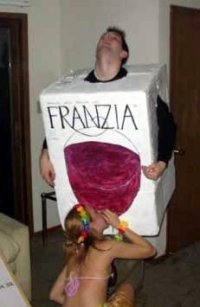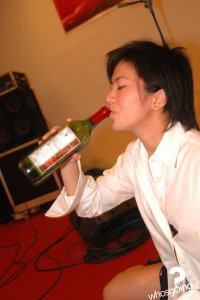The peaches squirt, the tomatoes drip, and don't get me started on the chew of the frisky, wild-yeasted bread. I love eating in California. Whenever I return from the Golden State to my New York City five-floor walk-up, I am laden down with the state's riches. So why is it that for the last 10 years I can't drink the wines?
Back in the late '70s, California whupped the French at wine competitions with offerings that were classily expressive and mostly low-tech. But, by the year 2000, California lost its way, something I attribute, in part, to the desperate desire for 95-plus-point ratings, that ultimate affirmation from top wine critics. Forget "Eureka," the new state motto can well be: "Anything worth doing is worth overdoing." Today's California wines are overblown, over-alcoholed, over-oaked, overpriced and over-manipulated.
When I first stopped drinking the Left Coast, it was because I was offended by the overuse of wood, boring flavors and lack of structure. The wines, many of which had plenty of edge and personality, seemed neutered to me. I soon learned that the other part of the story was that an arsenal of technology was deployed to make them that way: yeast, enzymes, tannin, oak and acid, as well as over-extracting techniques, micro-oxygenation, dialysis and reverse osmosis.
Even when winemakers shun these technologies and attempt a naturalish wine, their grapes are often picked so ripe -- all the rage since famed winemaker Helen Turley was anointed a grape goddess by famed critic Robert M. Parker Jr. back in the mid-1990s -- that all chance for complexity and interest is stripped away. There are so many strikes against the local wines -- not the least the taste and the cost -- that when I evaluate them, I think not in terms of whether I like them but whether I can tolerate them.
But take heart, Golden State, you're not alone in making what I consider to be undrinkable wine. About 90% of the rest of mondo del vino has been similarly corrupted. Mercifully, there are still a few beauties made, mostly in France, by vignerons who could care less what the critics think or even what the public thinks it likes. Instead, they make wines of authenticity. Try, for example, the cot (malbec) from the Loire's Clos Roche Blanche (under $20), which makes me conjure up violets floating through a chalk straw. Or Pierre Gonon's St. Joseph (under $40), which illustrates what syrah should taste like -- and it's not cherry vanilla.
Sure, France makes oceans of crappy stuff, but there is also an ever-expanding band of winemakers fiercely committed to working with, not against, nature. Their philosophy is spreading to Italy and slowly to the rest of Europe, while California has been slow on the uptake. And what's more, even with the beastly exchange rate, they are bargains compared with the pricey bottles from Napa or Santa Barbara counties.
This spring, I wondered if while I was otherwise occupied, California vintners had found the road to sanity. I took advantage of the flowering of spring distributor events in New York City. I went tasting and found too many wines still based on over-ripe fruit. Alcohol levels still flirted with those as high as port. Even wine from prized makers such as Heidi Barrett or the highly touted ones from Sea Smoke and Brewer-Clifton were disasters.
At one tasting, I stopped by a relative newcomer, Stewart Cellars. Michael Stewart, a Texan, told me he discarded the 2005 vintage because it tasted "too French." When asked what that meant, he replied "more earth than fruit." Then he added, "I want to make a California wine, not a French wine."
Dull, fruit-driven, alcoholic wines have become the incontrovertible wine identity of California. Or is there hope?
Two tables down, Napa winemaker Cathy Corison stood flanked by decanters and bottles. Her '03 Kronos was shockingly elegant. Her 1996 cabernet wore its gorgeous herbs unapologetically, with vibrancy. The wines weighed in at a miraculous 13.6% alcohol, compared with a more typical 14.9% and beyond. I asked her how she managed this remarkable feat, and she answered: "I don't make wine from prunes. I don't make Las Vegas showgirls."
Forever the cynic, I asked if she had perhaps reduced the alcohol with reverse osmosis. Her response was something along the line of: On a cold day in hell, I would. She has never followed the fashion; she has stayed true to her mission. There aren't many like her around.
Around the aisle from her stood a grinning Mike Dashe. I heard he recently made a wine so un-Californian he was at risk of deportation. It was made in a manner worthy of the French natural wine movement: organic, no added yeasts or trickery, no wood influence. It was a zinfandel with structure and earth and lightness. It also had a color that a famous wine critic might call "feeble."
"I can't show this to critics," Dashe said. "They'd be offended." It was delicious.
Maybe these two represent a fledgling natural wine revolution. If so, I'll certainly wave that flag. But until the overthrow is complete and more California vintners give making real wine a go, I'll always have France.
Alice Feiring
Monday, May 5, 2008
Subscribe to:
Comments (Atom)



